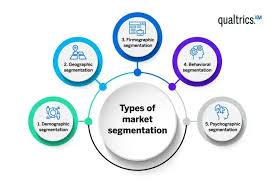The Power of Market Segmentation in Modern Business
Market segmentation is a vital strategy that businesses use to target specific customer groups effectively. By dividing the market into distinct segments based on demographics, psychographics, behaviour, or other factors, companies can tailor their products and marketing efforts to meet the unique needs and preferences of each segment.
One of the key benefits of market segmentation is the ability to enhance customer satisfaction. By understanding the diverse needs of different customer segments, businesses can develop products and services that resonate with each group, leading to increased customer loyalty and retention.
Furthermore, market segmentation enables companies to allocate their resources more efficiently. Instead of adopting a one-size-fits-all approach, businesses can focus their marketing efforts on the segments that offer the highest potential for growth and profitability.
Another advantage of market segmentation is its role in fostering innovation. By gaining insights into the distinct preferences and behaviours of various customer segments, businesses can identify new opportunities for product development and differentiation.
However, effective market segmentation requires thorough research and analysis. Businesses must gather data on consumer characteristics, purchasing behaviour, and preferences to identify meaningful segments. Moreover, companies need to continuously monitor market trends and adjust their segmentation strategies accordingly to stay competitive in a rapidly evolving business landscape.
In conclusion, market segmentation is a powerful tool that allows businesses to connect with customers on a deeper level and drive sustainable growth. By understanding the unique needs of different customer segments and tailoring their strategies accordingly, companies can build stronger relationships with customers and achieve long-term success in today’s dynamic marketplace.
Essential Tips for Effective Market Segmentation: Understanding Demographics, Psychographics, Behaviour, Geography, and Adaptation
- Understand your target audience’s demographics, such as age, gender, income level, and location.
- Consider psychographic factors like values, interests, attitudes, and lifestyles when segmenting the market.
- Use behavioural segmentation to group consumers based on their purchasing behaviour and patterns.
- Implement geographic segmentation by dividing the market based on regions, countries, or population density.
- Regularly review and update your market segments to ensure they remain relevant and effective.
Understand your target audience’s demographics, such as age, gender, income level, and location.
To effectively implement market segmentation, it is crucial to have a deep understanding of your target audience’s demographics. By analysing factors such as age, gender, income level, and location, businesses can create tailored marketing strategies that resonate with specific customer groups. This insight allows companies to deliver personalised messages and products that address the unique needs and preferences of each segment, ultimately leading to increased customer engagement and loyalty.
Consider psychographic factors like values, interests, attitudes, and lifestyles when segmenting the market.
When implementing market segmentation strategies, it is crucial to consider psychographic factors such as values, interests, attitudes, and lifestyles. These aspects provide valuable insights into the mindset and behaviour of consumers, allowing businesses to create targeted marketing campaigns that resonate with specific segments of the market. By understanding the unique values and preferences of different customer groups, companies can tailor their products and messaging to align with the lifestyles and attitudes of their target audience, ultimately leading to more effective engagement and increased brand loyalty.
Use behavioural segmentation to group consumers based on their purchasing behaviour and patterns.
Utilising behavioural segmentation to categorise consumers according to their purchasing behaviour and patterns is a strategic approach in market segmentation. By analysing how customers interact with products or services, businesses can gain valuable insights into their preferences, buying habits, and decision-making processes. This method allows companies to tailor their marketing strategies more effectively, offering personalised experiences that resonate with each consumer segment. Understanding the nuances of consumer behaviour can lead to targeted campaigns, improved customer engagement, and ultimately, increased sales and brand loyalty.
Implement geographic segmentation by dividing the market based on regions, countries, or population density.
To enhance your market segmentation strategy, consider implementing geographic segmentation by dividing the market based on regions, countries, or population density. This approach allows businesses to target specific geographical areas with tailored products and marketing campaigns that resonate with the local population. By understanding the unique characteristics and preferences of different regions, companies can effectively reach their target audience and drive engagement and sales in specific geographic markets. Geographical segmentation can provide valuable insights into local consumer behaviour and trends, enabling businesses to make informed decisions and maximise their marketing efforts for optimal results.
Regularly review and update your market segments to ensure they remain relevant and effective.
It is crucial for businesses to regularly review and update their market segments to ensure that they stay relevant and effective. Consumer preferences, behaviours, and market dynamics are constantly evolving, making it essential for companies to stay agile and responsive. By regularly reassessing their segmentation strategies, businesses can adapt to changing trends, identify emerging opportunities, and maintain a competitive edge in the market. Keeping market segments up-to-date enables companies to tailor their products and marketing efforts more accurately, leading to increased customer satisfaction and improved business performance.

